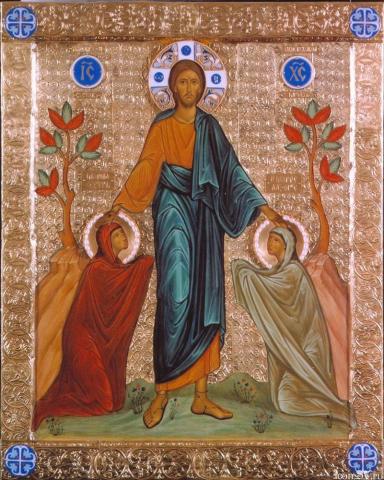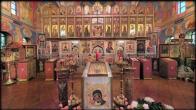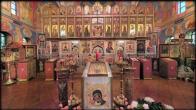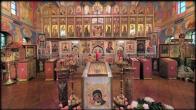You are here
“THE NEW AND GLORIOUS MORN”

Most Americans, even most American Christians, celebrate Christmas much more than Easter, yet it is only Easter — Pascha — that makes sense of Christmas. The birth of Christ is only something to celebrate if you know the rest of the story. Consider the English lyrics of the French hymn “O Holy Night,” about the night “of our dear Savior’s birth”:
Long lay the world in sin and error pining,
ʼTil He appeared and the soul felt its worth,
A thrill of hope, the weary world rejoices,
For yonder breaks a new and glorious morn.
These words were written in 1855 by a minister who knew the rest of the story, but at the time of the Nativity no mere mortal did. Not even those who welcomed Christ’s coming knew what kind of king He would be or what kind of hope of He would bring.
Their world still lay in sin and error pining (suffering). Unbelievers of our day have labored to depict the ancient Greeks and Romans as pious, happy pagans, but they were in truth quite miserable and demoralized, much like people today. Philosophy had destroyed belief in traditional religion. No educated person could seriously believe in the gods of myth. Their loss of faith showed up in sharp declines in funding for public cults. “By a neat irony,” writes historian Robin Lane Fox, the Incarnation of Christ occurred at a low point in the building and maintenance of pagan temples.
The Jews of that day were also demoralized. They had returned from exile in Babylon and rebuilt the temple in Jerusalem, but the Ark of the Covenant had been lost, and so the inner sanctum of the temple, the Holy of Holies, was empty. God seemed to have abandoned the Jews. Their great prophets and patriarchs were all in the past. Conquered again by the Greeks and then the Romans, many Jews adopted Greek ways of thinking and living.
The Old Testament tells us time and time again that the “fear of the Lord is the beginning of wisdom.” (Psalm 111:10, cf. 25:12, 25:14; Proverbs 1:7, 1:29, 2:5, 9:10, 15:33; Job 28:28) Yet in the centuries just before the coming of Christ, it seems that fewer and fewer people feared God. The literature of the era speaks of a spreading atheism. The so-called “Book of Wisdom” or “Wisdom of Solomon,” written in the first or second century before Christ, opens with a summary of atheistic thinking:
For the ungodly said, reasoning with themselves, but not aright, “Our life is short and tedious, and in the death of a man there is no remedy: neither was there any man known to have returned from the grave. . . . Come on therefore, let us enjoy the good things that are present . . . Let us oppress the poor righteous man, let us not spare the widow, nor reverence the ancient gray hairs of the aged. Let our strength be the law of justice: for that which is feeble is found to be nothing worth.”
Here we face an obvious truth that today’s world would rather we not notice: If there is no God, we have no reason not to make pleasure our only aim, no reason not to prey upon our fellows, no reason not to despise humility as weakness, no reason not to dismiss reverence, compassion, and self-giving as pious nonsense.
Christ came preaching reverence, humility, compassion, and self-giving, and the ungodly killed Him for it, expecting His death to be the end of the story. Strangely, even for some Western Christians, the Gospel story sometimes ends on the cross, with Christ’s “substitutionary sacrifice” satisfying “divine justice” by “paying the debt of our sins.”
But if the story ended on the cross, Christ’s suffering and death would have accomplished nothing. His disheartened disciples would have despaired and disbanded. The people who had flocked to Jesus as their deliverer would have returned home disillusioned and discouraged. Jesus of Nazareth would have been remembered only briefly as yet another false hope.
If the story ended on the cross, the lesson learned from Christ’s life would have been that crime pays, that truth-telling doesn’t, and that one had better go along with evil to get along with others, because death conquers all. If the story ended on the cross, then the atheists in the Book of Wisdom are the last of the true prophets. If the story ended on the cross, then the fear of God is not the beginning of wisdom but instead the end of it.
But the story does not end on the cross, for Christ’s death and burial are followed by His Resurrection!
By rising from the dead, Christ proves empirically to those who witnessed His Resurrection —
* That there is a spiritual dimension to our existence beyond the material world of our senses;
* That there is a God of the character revealed by Christ — a good God, a just God, a God of truth and love, a Father who loves the world so much that He gives it his Son, and a Son who loves us and the Father so much that He endures death to save us;
* That God the Father will make good the Son’s promise of a resurrection for all and a final accounting of how we have lived our lives;
* That in the hope of the resurrection and with the promise of everlasting life, we need no longer fear death; and finally
* That no longer fearing death, we need no longer sin to avoid it, victimizing others to save ourselves.
Thus we say that by dying and then again rising, Christ destroyed the power of death over us, freeing us from the fear that forces us to sin and empowering us to also live sinlessly, having the imagination of our hearts impressed by His divine example, the image of both the good God and the Godlike man.
For Christ was fully human, sharing with us the same human nature and enduring like us the needs and desires of both mind and body, knowing pain and pleasure as well as joy and fear. He was a man in all respects like us, with one exception: Being God, He was not estranged from God, as we are. In Him, one personal instance of human being kept
its proper place with God and so remained all that it was meant to be — sinless, immortal, and divine. Nothing human held Him back. Nothing that we are by nature, and therefore cannot help but be, kept Him from living divinely — or will keep us from living divinely when we are united with God through Christ.
This is the glory hidden from human eyes at Christ’s Nativity but revealed at His Resurrection. “Long lay the world in sin and error pining,” but not until the Resurrection did Christ appear with saving power to those living and dead. Only then did the soul of man feel its worth. Only then did man again catch a glimpse of God and of his own true nature and destiny — the thrill of hope, in a weary world, for a new and glorious morn!
Protodeacon Patrick Mitchell
Parish Life, April 2015
PARISH LIFE
RECENT VIDEOS
Address of our Cathedral
Subscribe to our mailing list
While all the materials on this site are copyrighted, you may use them freely as long as you treat them
with respect and provide attribution on the Russian Orthodox Cathedral of St.John the Baptist of Washington DC.









